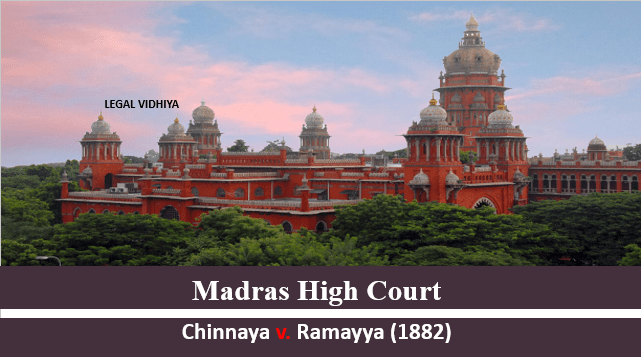
| Citation | ILR (1876-82) 4 Mad 137 |
| Judgment | 21 October 1987 |
| Court | High Court of Madras |
| Bench | Innes J, Kindersley J |
| Appellant | Venkata Chinnaya |
| Respondent | Venkata RamayyaGaru |
| Statute | Section 2 & Section 10, Indian Contract Act 1872 |
Background:
This case revolves around the concept of “Privity of Consideration”. This is a concept which is observed in English Contract Law. Privity of Consideration states that no party who is not privy or a part of the contract cannot offer to put up consideration on behalf of one or more parties directly involved in the contract and the consideration have to be offered by the parties themselves.
Consideration refers to quid pro quo, an exchange of goods, services or performance or abstinence from performance of something from the side of all the parties involved in the contract. It is an essential element for an agreement to classify as a contract.
In this case the judges struck down the concept of privity of consideration from being followed very strictly in India.
Facts:
This case involves 3 people. An old lady, her daughter, Venkata RamayyaGaru (respondent) and her sister, Venkata Chinnaya i.e. the aunt of the respondent (appellant).
The old lady gives a piece of real estate owned by her to her daughter by an official gift deed.
She put up a condition on her daughter that she would pay Rupees 653 to her aunt every year in return for possessing the real estate.
The daughter agreed to this and a contract was formed between the daughter and her aunt for the daughter to pay the amount every year.
After some time, the old lady passed away, after this the daughter stopped paying the amount to the aunt. The aunt sued her for non-payment of that amount that was agreed upon.
Issues:
- Whether the contract can be enforced even though the consideration was provided by a third party.
- Whether the rule of privity is applicable under Indian Contract Act or not.
Argument by appellant:
The counsels for the appellant argued that the respondent had entered into a contract to pay the annuity amount. The promise to pay the annuity was the consideration from the side of the respondent.
Therefore, after she got the possession of the real estate she is under an obligation to pay the amount every year as per the contract formed.
Argument by respondent:
The concept of privity of consideration was invoked by the respondent.
It was argued that the property gifted to her by her mother was no consideration since it was given by a third party and since the appellant is not providing the respondent with any consideration, she does not have to pay the amount to her.
Judgment:
It was held by the court that the concept of privity of consideration is not valid under the Indian Contract Act. To back this statement, section 2(d) of the act was quoted by Justice Innes. This section stated that consideration is an essential element of any contract and said consideration can be provided by the promisee or any other person on behalf of the promisee.
Therefore, even though the appellant was not familiar with the property that was gifted to the respondent, it would still be considered as good consideration since her mother intended to gift it to her as a consideration on behalf of the appellant.
Lastly, Justice Kindersley stated that the gifted property and the promise to pay an annuity of Rupees 653 are considerations on behalf of both parties, therefore, the contract is enforceable under law.
Hence, the respondent was liable to pay the annuity even after the death of the mother.
Conclusion:
This case laid down the fact that a stranger to contract can never sue a party of contract but a stranger to consideration can sue a party as long as the consideration has been provided on behalf of him/her.
In short, it can be concluded that India does not follow the concept of privity of consideration.
However, various changes have been suggested in order to minimize the interference by third parties in a contract by only maintaining the cases where the third party has a direct interest in the contract.
References:
https://blog.ipleaders.in/chinnaya-vs-ramayya-an-analysis/#Chinnaya_vs_Ramayya_1882.
https://lawlex.org/lex-bulletin/case-summary-chinnaya-vs-ramayya/23389
https://lawfoyer.in/chinnaya-vs-ramayya/
This article is written by Kabir Chhibber of Vivekananda Institute of Professional Studies, an intern at Legal Vidhiya.




0 Comments